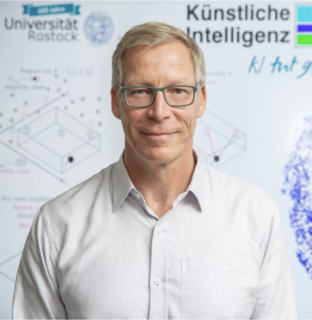Von der Bedeutung und den Grenzen der Modellierung für die Wissenschaft und die Gesellschaft
Keynote Do 30.03. 9:00-10:30 Uhr
Olaf Wolkenhauer
Moderator: Walter Koch, Schaeffler AG
Abstract:
Die Pandemie hat die mathematische Modellierung ins Rampenlicht gerückt. Es kommt nicht oft vor, dass auf mathematischen Modellen basierende Vorhersagen zu politischen und wirtschaftlichen Entscheidungen von solchem Ausmaß führen.
Ich möchte darüber nachdenken welche Rolle Modelle im Allgemeinen spielen, und was wir aus der Modellierung komplexer lebender Systeme lernen können. Dabei möchte ich darauf eingehen, wie sich die Modellierung lebender Systeme von der in den Natur- und Ingenieurwissenschaften unterscheidet.
Und was sind die verpassten Chancen und Grenzen der mathematischen Modellierung als Erweiterung der menschlichen Intuition auf den Bereich komplexer Systeme?
Olaf Wolkenhauer

CV
I received my first degrees in systems and control engineering (Hamburg & Portsmouth and his PhD for research in possibility theory with applications to data analysis. I spent over ten years at the University of Manchester Institute of Science and Technology. In 2005, I became a fellow of the Stellenbosch Institute for Advanced Study and holds professorships at Case Western Reserve University, USA and Chhattisgarh Swami Vivekanand Technical University, India. In 2003, I was appointed as professor for systems biology and bioinformatics at the University of Rostock in Germany. Since 2015, I am an elected member of the Foundations in Medicine and Biology review panel of the German Research Foundation (DFG). From 2020, I am also a guest professor at the Leibniz Institute for Food Systems Biology at the Technical University Munich. I am using mathematical modelling, statistical and computational tools to make sense of biological and medical data. With 20 years of experience in interdisciplinary research, I combine data-driven modelling with model-driven experimentation, using a wide range of approaches, from machine learning, statistics, to systems theory. The results of this work support basic biological and medical research, as well as applications in industry.